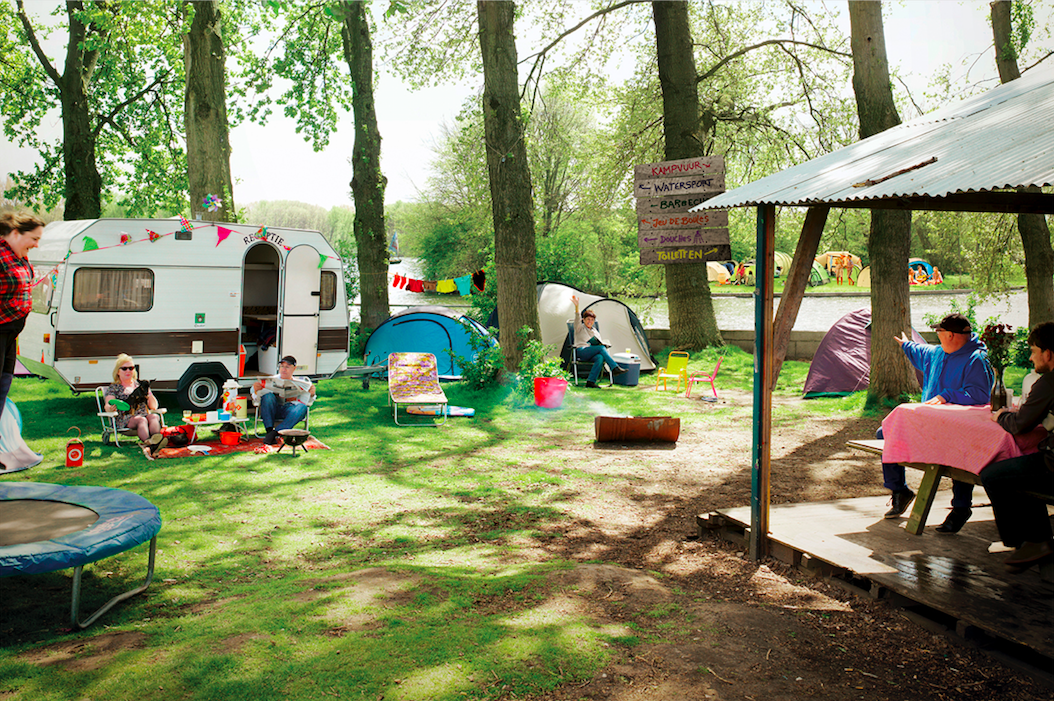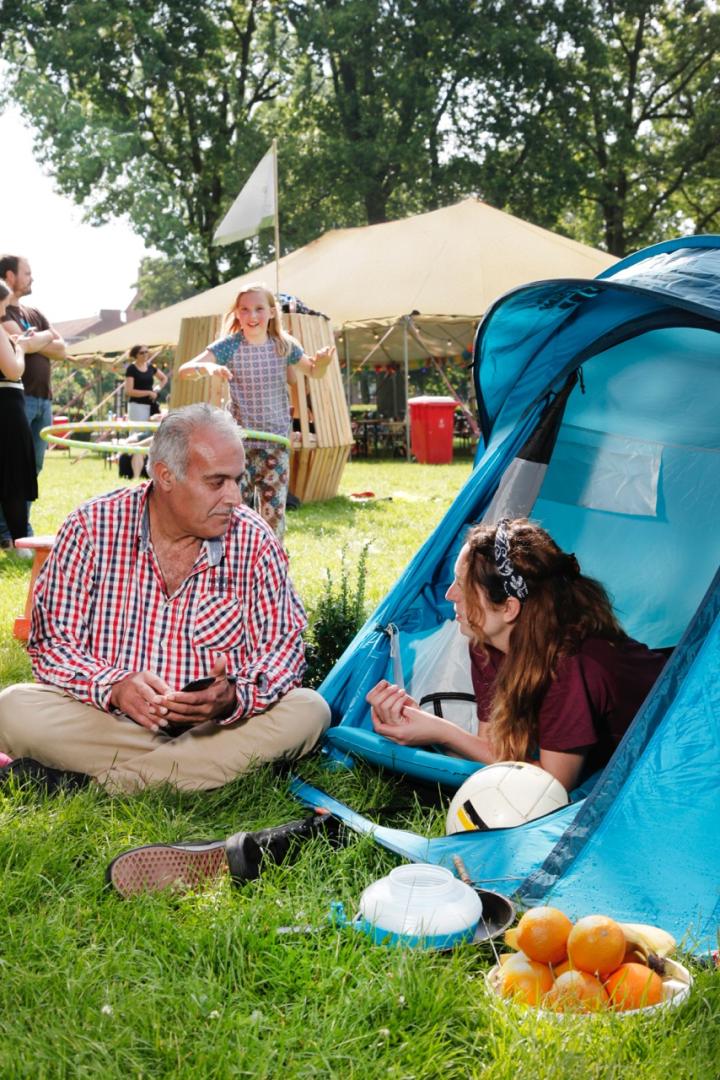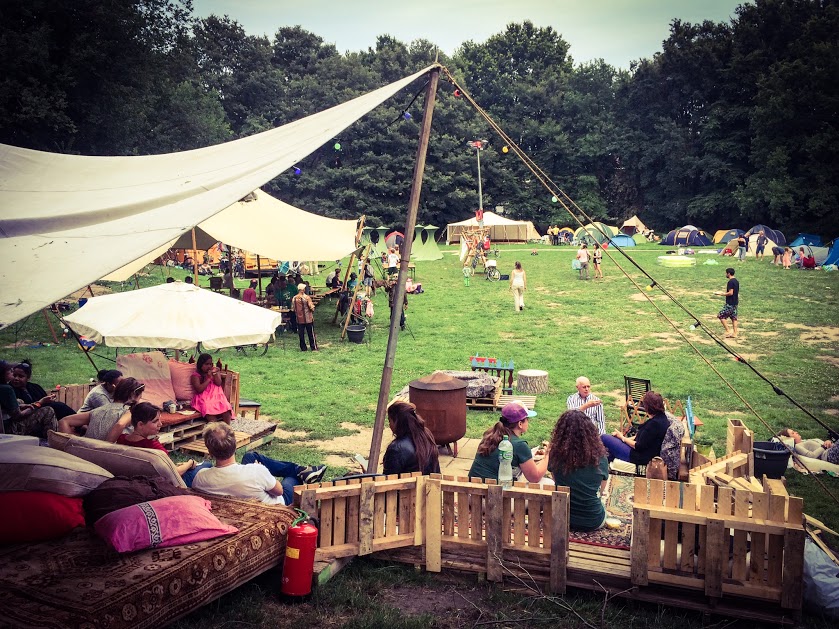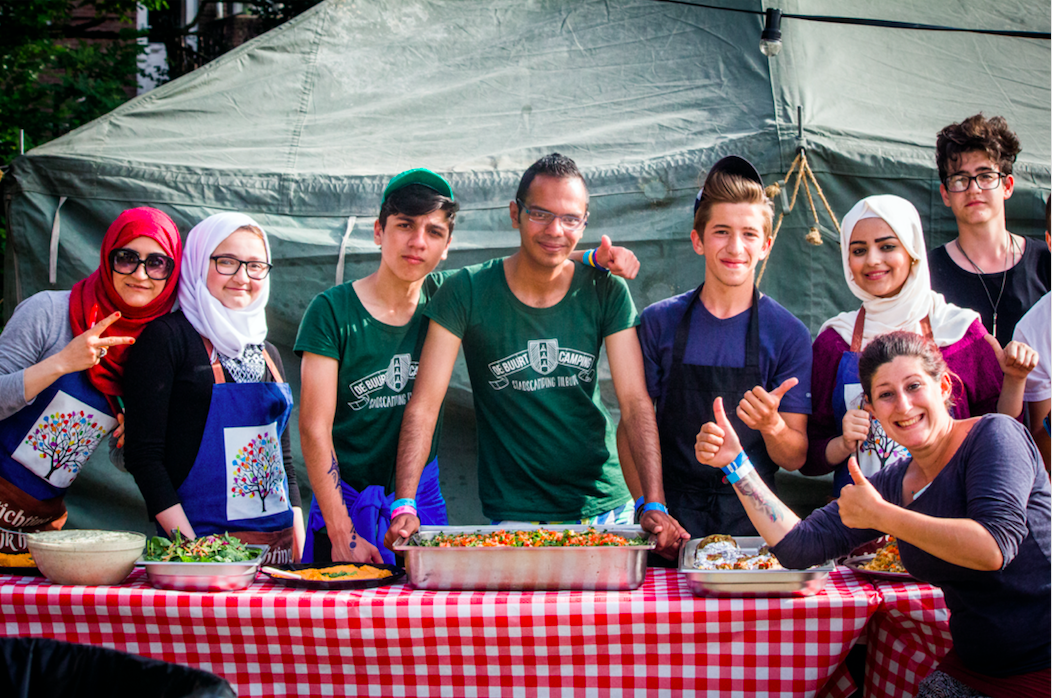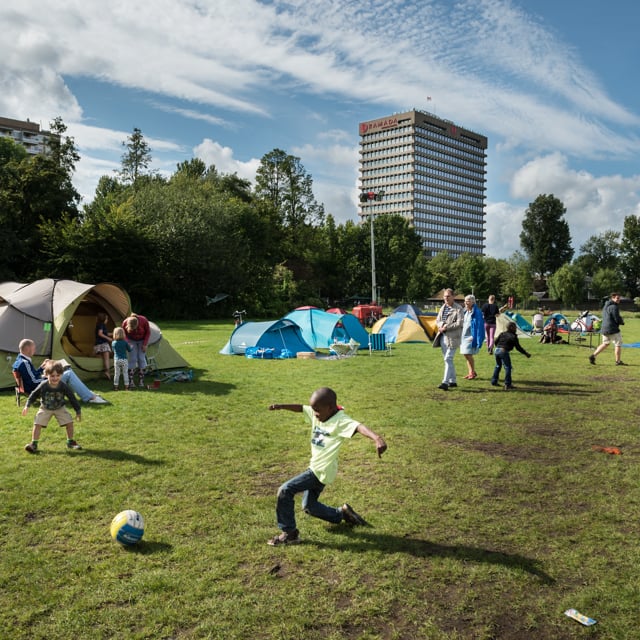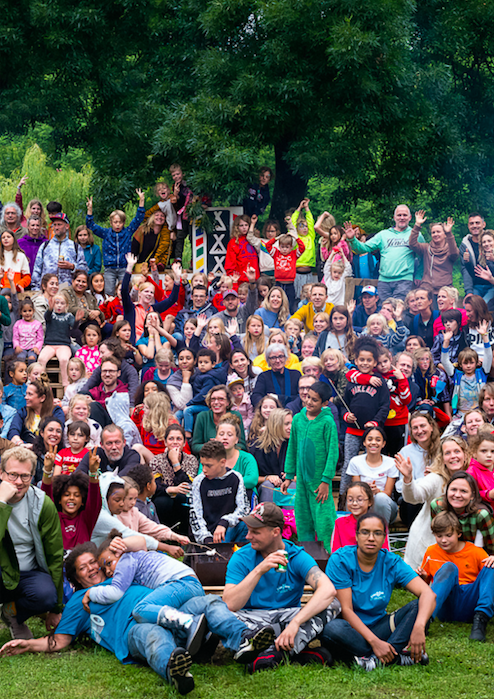De Buurtcamping // Neighborhood Campsite
Basic information
Project Title
Full project title
Category
Project Description
‘De Buurtcamping’ invites neighbours to share a short holiday together in the summer. Since 2013 our foundation helps residents to organise campsites in their own city parks. For months, local campsite managers, volunteers and local organisations make preparations to transform the park for three days into a small peaceful village in the middle of the big city. The campsite is a place for both special encounters and sustainable social connections in the neighbourhood.
Project Region
EU Programme or fund
Description of the project
Summary
Since 2013 our foundation helps residents to organise campsites in their own city parks. The idea is simple: ordinary city parks are transformed in campsites where different people from a neighborhood can go camping. For months, local campsite managers along with hundreds of volunteers and local organisations work together on the preparations to ultimately transform the park for three days into a small peaceful village in the middle of the big city. The concept has grown from 1 park in 2013 to more than 40 this year.
With this "joint effort" of setting up a Neighborhood Campsite, we try to achieve different social goals. The three most important are:
- Improve social cohesion by creating a setting for encounter. On average, people got to know 13 other people, 80% of these encounters take place with someons 'outside of their bubble'. It's a low-key setting, you have to chat with neighbors who set up their tent together, barbecue, a couple even married during the campsite, with all campers as guests! Because it's so unusual, it's a place for special experiences.
- A holiday for everyone. The campsite managers go into the neighborhood and reach as many different groups as possible. and it works: you'll find people of all sorts and sizes from yuppies to homeless people a real representation of the neighborhood. 1/3 of the places are reserved for people who could normally not go on holiday.
- Active citizenship: Residents organize a whole campsite and learn to do placemaking in their own neighborhood. Next to that there are many volunteers to help out and organize something small; salsa lessons, a flower workshop or sports tournament. 45% of the participants became more active in their neighborhood because of the Neighborhood Campsite.
Key objectives for sustainability
The Neighborhood Campsite provides the most sustainable vacation possible, since there is no travel movement involved. The concept is to use the green spots in cities in an optimal way, and to get more in touch with nature and green.
A survey under participants (2014) has shown that 20% of the participants visit the park more often, because of the Neighborhood Campsite. Also, at each campsite there are many activities within the category Nature such as foraging and bird tours.
Moreover, there is a 'leave no trace' principle, so the park terrain will be restored in original state. The idea is that people bring or borrow camping/holiday materials and reusable tablewear, so there are no disposable plastics.
Key objectives for aesthetics and quality
Local residents (so called campsite managers) organize a campsite together with tens of volunteers from the neighborhood. There are some important principles (a.o. mix of campers, small scale, leave no trace, affordable etc.) and there is a national brand identity that the local campsites have to use in their utterances online and at the site (flags, gate etc). We also provide them with an example layout for their campsite (position of the central tent, sanitair, reception etc.).
The Neighborhood Campsite is cuddly at the frontside, and professionally organized at the backside. The Neigborhood Campsite foundation supports with filling in permits and guarding safety on the terrain. For the people at the terrain there are little obstacles for joining in (to go camping or do activities), but everything is well prepared and our organizers receive professional guidance. This is one of the reasons for succes.
For the rest, each Neighborhood Campsite is unique since it is made with the neighborhood for the neighborhood. Participants, volunteers and children come together in advance and organize DIY afternoons to make a large welcoming gate, signposts and other decoration. Next to that each campsite has an unique programming since they work together with tens of local organizations and residents to create activities at their site. From salsa dancing to hugging rabbits and from campfire songs to Bingo, from morning to evening there are many things to do. Although the concept and central principles for all 43 campsites are the same, no experience is alike.
Key objectives for inclusion
We live more and more in ‘bubbles' - there are several gaps in society, between high and low educated, age, income and cultural background. Connection between different layers of the population, can only be created when no groups are excluded cannot participate due to economic circumstances of cultural norms.
At the Neighborhood Campsite everyone (from the neighborhood) is welcome. We'd like to offer everyone the opportunity to go on holiday, in their own city, along with a diverse group of local residents. For participants we make a division on basis of income (at the backend): ⅓ of the places are reserved for people with a low income, ⅓ for volunteers. They camp for free or against a low rate. ⅓ is for paying participants. This division on basis of income makes sure each campsite attracts different groups, while at the campsite itself everyone is equal. We all look the same in our camping-outfit.
For the recruitment of people we collaborate with many local organizations, key figures in the area and make promotion in the neighborhoods with our volunteers by talking to people on the streets, at the supermarket, foodbank, mosques and churches, community centres and schools, and by hanging postWe do not directly target on ethnicity or culture since from all people who live under the poverty line about half has a migration background, so the idea is that by recruiting people with low income different cultures are targeted as well (CBS, 2017).
Moreover we make sure the campsite is not appropriated by a single group. For example we make sure we have different barbeques, one for vegetarians, one for meat and one for halal. We also don't sell (expensive) consumptions or alcohol. Next to that we give workshops about diversity to the campsite managers. For example about how to handle people who express resistance against vaccinations in times of corona.
Results in relation to category
The Neighborhood Campsite is an exemplary project aimed at overcoming segregation with deep involvement of citizens and local stakeholders, by using public space in a different way than usual. Places for encounter are more and more under pressure. There is increasing individualisation, cutbacks lead to the closure of community centers and there is privatization of meeting places. And because of the corona measures new and spontaneous encounters take even less place. This has lead to tension on social cohesion in neighborhoods and is frightful for society on the long term. Good contact in your neighborhood is even more important in times of corona. Your world is getting smaller which means you need people nearby for social contact and a network to support each other and take care of each other.
The Neighborhood Campsite helping to put local entrepreneurs and organizations and the natural qualities of the neighborhood on the mental map of residents. With the Neighborhood Campsite, the mental representation of the park is filled with a new meaning, which on its turn gives a sense of familiarity and may stimulate people to undertake other activities in the park in the future and give them a greater sense of responsibility for the place. The neighborhood campsite is also a place where local issues are being discussed.
After the Neighborhood Campsite 1 out of 5 respondents visited the parksite more often than usual. 34% of the respondents indicated they have get to know the park better thanks to the Neighborhood Campsite. Moreover 35% says they feel more at home in the neighborhood because of the Neighborhood Campsite.
How Citizens benefit
The Neighborhood Campsite is a great example of the term 'placemaking'. This is a philosophy and methodology whereby the idea is central that public places can be best improved on basis of local knowlegde and local qualities by the local communities themselves. Our foundation and local government are working on the background to facilitate residents to transform the park into a special place in tune with local needs and wishes.
The number of campers is between 50 and 350 per campsite with an average of 150. Each campsite collaborates with about 50 local organizations. On average there are 3-5 campsite managers and 40-50 volunteers per campsite. Residents are acquainted with volunteering on a low key manner. They realise they can do volunteer work that is fun as well or that is more loose or flexible. Moreover because of the local collaborations people get in touch with organisations where they can do volunteer work for.
For 63%, the Neighborhood Campsite has contributed to become more active in the neighborhood. A post-measurement shows that more than 45% has actually started to engage more actively in the neighborhood by the Neighborhood Campsite. For 37% of the respondents, the Neighborhood Campsite even has lead to (voluntary) work (averages of the years 2014-2019).
Innovative character
Roderik Schaepman is founder of the Neighborhood Campsite. For years he lived in the city of Amsterdam, but he started missing the community feeling and nature from the small village he came from. He tried to bring this back to the city by a making little village in the city parks: a Neighborhood Campsite. It is a cheerful, simple and inclusive idea that brings positivity and makes you want to join. It is a small-scale solution for many large problems.
We make different kinds of people - young and old, alone or with six children, with or without a house - share a mini holiday together. This makes the Neighborhood Campsite an important means for dealing with growing contradictions in the neighborhood, because it excludes no one, and make people get out of their bubble in a casual way and keep seeing each other more often afterwards. During the Neighborhood Campsite people celebrate holidays and simultaneously make social contacts and learn useful ones skills and gain access to a neighborhood network of organizations and institutions. And that is badly needed today because gaps in society widens and we'd rather talk over each other than with each other.
De Buurtcamping is now the fastest growing 'social franchise' of The Netherlands. In 2021 there are 43 campsites planned. The Neighborhood Campsite Foundation inspired and guided local residents throughout the country with the organization of their own Neighborhood Campsite. Through our training program De BuurtCampus, online platform for administrators the CampingGuide, through access to funding sources,
sponsorship deals and with personal help and support from our community managers.

